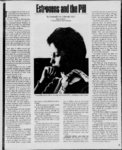| OCR Text |
Show he newspapers and air waves are saturated with stories about newly recognized risks from medicines containing estrogens. The Food and Drug Administration has received thousands of inquiries from concerned women. Hundreds of thousands of women have questioned by Alexander M. Schmidt, M.D. Commissioner, Food and Drug Administration their physicians about whether they should take these medicines. There is legitimate reason for women to be asking. The adverse effects being talked about include heart attacks from birth control pills and cancer of the uterus from estrogens used during and after menopause. And estrogens, either alone or as the major ingredient in birth control pills, are among the most prescribed medicines in Ameri- com-!mon- ly ca . More than 15 million women take estrogens every day. Indeed, a woman could take estrogens all her adult life as a birth control pill, to treat the uncomfortable symptoms of menopause, and later as a drug, when many women believe that they feel better, look better and lead more active lives with the help of estrogen drugs. But every medicine has risks as well as benefits. Estrogens are no exception. But it is up to the individual to decide whether the benefits of these drugs outweigh the risks for her. Here is what we know: BIRTH CONTROL PILLS: Except for permanent methods such as tying the fallopian tubes in women or doing a vasectomy in males, the pill is the most effective means of contraception. When used properly, the pill is over 99 percent effective. It is somewhat more effective than the intrauterine device (IUD), and much more effective than other contraceptive methods such as the diaphragm and the condom, which are not as convenient as the pill or IUD and are not used as conscientiously. The pill also can help regulate a woman's menstrual cycle, is free of all but minor side effects for most women and is convenient. The most serious risk from estrogens for birth control is an increased tendency for blood clots to form. When a clot forms in the large veins of the leg or pelvis, the clot may break off and travel to the lungs, causing a pulmonary embolism that may be fatal. Blood clots also may form in arteries going to the brain (causing strokes) or the heart (causing heart attacks). There are other risks: The pill may harm a developing fetus, should the pill fail and a woman become pregnant. Any woman taking the pill who suspects she is pregnant should see her doctor right away. Birth control pills appear on rare occasion to cause liver tumors, most or all of them benign. Though benign, drugs containing A I women do not need any treatment and some need more than drugs, estrogens can provide major relief from "hot flashes" and occasionally from symptoms such as vaginal dryness. Much has been written in popular magazines about the benefits of estrogens after the menopause. Estrogens have been touted as the "feminine forever" drugs. But FDA has not been able to find any scientific evidence that estrogens help give women a more youthful appearance. Until recently, estrogen in the menopausal and years genBut in erally was considered risk-fre- e. December, 1975, we learned that women who take estrogens for more than a year during and after menopause appear to have a much higher risk of developing cancer of the uterus than other women five in 1000, compared to one in 1000, each year. The longer estrogens are taken, the higher the risk of cancer of the uterus. Other health factors also increase the risk. These include diabetes, high blood pressure and obesity. The Food and Drug Administration approves the sale of an estrogen or any other drug only if it is convinced that its benefits are greater than its risks. It is FDA's present view, backed by the best science and the best judgment we can bring to bear, that gen-containing medicines are useful, effective and safe, when properly used. For birth control pills, FDA now advises that women over 40 should use some other method of contraception. Any woman taking the pill should be examined regularly by her physician. Women with a history of breast cancer or cancer of the uterus or of blood clotting should not take the pill. It is clear that new scientific findings dictate that changes must be made in how estrogens are used and for hov' long by women during and after ita menopause. We now advise physicians against prescribing estrogens routinely for long periods of time. For symptoms of the menopause, the lowest effective dose should be prescribed for the shortest time possible. If the drug is taken for extended periods during and after menopause, we advise that it be discontinued or reduced in dosage at regular intervals to allow the physician to assess whether estro- The possible adverse effects of using birth control pills these tumors can be fatal due to hemorrhage. Birth control pills roughly double the risk of developing gallstones. The pill may increase blood pressure in some women, although the blood pressure usually returns to normal when the pill is stopped. These risks must be looked at in perspective. The actual number of women who have serious side effects is quite small. And the risks also must be compared to those of other forms of contraception and to the risks of pregnancy. Statistics tell the story: taking all women who use the pill, aged 15 to 44, roughly three of 100,000 will die each year from complications of the pill. In contrast, the death rate from the intrauterine device is about one per 100,000 each year. Contraceptives such as the diaphragm and condom, backed up by abortion in is something to think about. case of failure, result in the lowest death rate of all forms of contraception less than one per 100,000 women a year. Sexually active women who use no contraceptives have the highest risk of death, because about 25 women per 100,000 who are pregnant die from complications of pregnancy. An important factor influencing the risk of the pill is age. The rate of blood clotting and heart attacks increases with age, especially in women in their late 30's and eaily 40's. The risks from other methods of contraception, such as the intrauterine device or diaphragm, are unrelated to age. For these reasons, we recommend that women over 40 use a method of contraception other than the pill. ESTROGENS MENOPAUSE: DURING AND AFTER THE The benefit of estrogens for short-teruse during the menopause is well established. While many m needed. We are deeply committed to the concept that women personally should ie involved in the decision whether to take these drugs. This means a woman should understand the purposes of the drugs, the benefits, the risks and the alternatives. FDA is now developing brochures for patients called "Patient Package Inserts" to accompany each prescription to help women participate in making the best decision. it is still 23 |



























































































































































































































